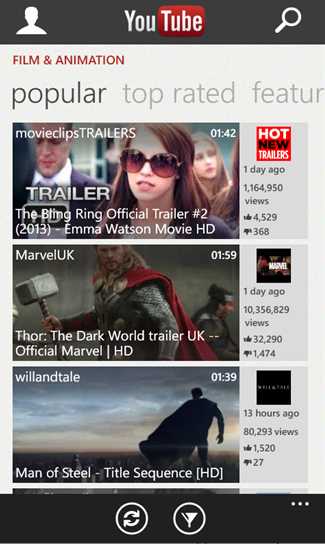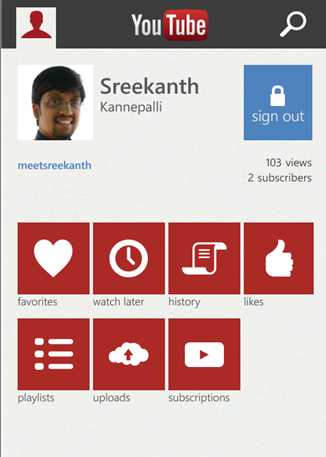| Google Blocks Windows Phone YouTube App Again |
| Written by Lucy Black |
| Friday, 16 August 2013 |
|
Google seems determined to stop Microsoft from providing a YouTube experience on Windows Phone that is comparable to that on Android and Apple and is using HTML5 as its weapon of choice. Having a good YouTube app available is a must for any self-respecting smartphone platform and back in May Microsoft produced a pretty superior one for Windows Phone 8 despite the fact that Google wouldn't give it access to its You Tube API. While WP8 phone users were pleased with the results of Microsoft's nifty reverse engineering that provide them with a full features app that included account support, playlists, commenting, and most other aspects of YouTube for Windows Phone 8, Google demanded they withdraw it. Microsoft agreed to withdraw the app and the two companies were going to work together to provide an alternative that would be acceptable to both parties using Google's API.
In May the main point of contention appeared to be that YouTube videos were being served without ads to monetize them so the new Microsoft app launched this week after three months of development does include ads but Google still isn't happy and has revoked the API key, disabling the app. So what grounds does Google now have for this draconian action? Answer - the new app hasn't been transitioned to HTML5 as stipulated by Google and instead uses Windows Phone 8's native code. In a blog post discussing The limits of Google’s openness, David Howard, Microsoft's Corporate Vice President & Deputy General Counsel, Litigation & Antitrust, explains This was an odd request since neither YouTube’s iPhone app nor its Android app are built on HTML5. Nevertheless, we dedicated significant engineering resources to examine the possibility. At the end of the day, experts from both companies recognized that building a YouTube app based on HTML5 would be technically difficult and time consuming, which is why we assume YouTube has not yet made the conversion for its iPhone and Android apps. He continues: It seems to us that Google’s reasons for blocking our app are manufactured so that we can’t give our users the same experience Android and iPhone users are getting. The roadblocks Google has set up are impossible to overcome, and they know it. Yes this does indeed seem to be a reasonable conclusion and Google's new objection - that the problem with the new app is that it doesn’t always serve ads based on conditions imposed by content creators - does appear to be Google's fault and not that of the Microsoft developers. Google it seems is still unwilling to hand over enough information to provide Windows Phone 8 with a level playing field. According to David Howard: Our app serves Google’s advertisements using all the metadata available to us. We’ve asked Google to provide whatever information iPhone and Android get so that we can mirror the way ads are served on these platforms more precisely. So far at least, Google has refused to give this information to us. We are quite confident that we can solve this issue if Google cooperates, but fixing Google’s concern here is entirely within Google’s control. If Google stops blocking our app, we are happy to work with them on this, entirely at Microsoft’s expense. How unreasonable is Google being? Well if it was just defending its Android platform, Google might be considered to be justifiably proprietorial, but its action is also benefiting Apple. In addition Google has made a commitment to openness - but this it seems doesn't extend to Microsoft. The biggest hypocrisy seems to be its insistence on HTML5 when its own developers concede that this task would be technically difficult. The only reason for this unreasonable request seems to be that it would result in a sub-standard app that would be yet another disincentive for users to adopt Windows Phone. It all raises the question of whose API is it anyway? If you implement an API which gives access to services that you provide, then presumably you are within your rights to deny access to anyone you care to. From this point of view, Google is well within its rights to keep Microsoft devices from using YouTube. This might not be desirable from Microsoft's point of view, and it might not be good for the general community, but it is clearly good for Google and, as a spin-off, Apple.
YouTube with a touch of WP8 tiles. More InformationRelated ArticlesGoogle Hands Over API To Microsoft Microsoft Meets Google Halfway Over WP8 App Google Takes On Ad-Blocker Microsoft
To be informed about new articles on I Programmer, install the I Programmer Toolbar, subscribe to the RSS feed, follow us on, Twitter, Facebook, Google+ or Linkedin, or sign up for our weekly newsletter.
Comments
or email your comment to: comments@i-programmer.info
|
| Last Updated ( Friday, 16 August 2013 ) |




